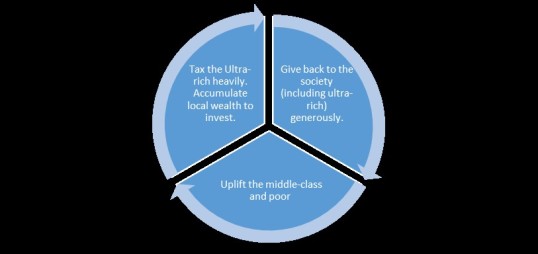एन आर एन
गैर आवासिय नेपाली संस्था एन आर एन ले सबै गैर आवासिय नेपाली हरुको प्रतिनिधित्व गर्दैन ।
यो संस्थाको बारेमा म जस्तो लामो समय देखी बिदेश बसिरहेका धेरै नेपालीहरुको फरक बिचार छ। म बिगत १० बर्ष देखी स्कटल्याण्ड बस्दै आएकोले संयुक्त आधिराज्य (UK) मा मैले देखेको, सुनेको, भोगेको कुरो र केही बिस्लेषण गर्दै छु।
एन आर एन को बिदेशमा महत्व:
छैन ।
सामान्यतया शहर वा छेत्रीय आधारमा बनेका संस्थाहरु महत्वपूर्ण छन , यिनिहरुले बेला बखत चाडबाड मा कार्यक्रम गर्ने , नेपालबाट कलाकार बोलाउने , नेपाली भाषा कक्ष सन्चालन गर्ने, मर्दा-पर्दा, जन्ती-मलामी मा सरसहयोग गर्ने गर्छन् । तर बुझ्नुपर्ने कुरा के भने आधिकांस एस्ता संस्थाहरु एन आर एन सँग सम्बन्धित छैनन , हैनन । तेसैले अैले नेपालमा हल्लिखल्लीका साथ चुनाव गर्नीहरुले बिदेशमा नेपाली भाषा संस्कृति जोगाएको भन्नि कुरा पूर्ण सत्य हैन , कम्तिमा स्कट्ल्यण्डमा यिनिहरुले नेपाली संस्कृति जोगाउन कुनै भूमिका खेलेका छैनन भन्नि कुरो म भन्न सक्छु । बरु यहाँको स्थानिय सरकार नगरपालिका वा स्कटिस सरकारले धेरथोर सहयोग गर्ने गरेको छ । अन्यथा नेपाली समुदाय आँफैले चन्दा उठाएर यो काम गर्छन् , आधिकांस नेपाली समुदायहरु एन आर एन का सदस्य हैनन । ति नेपाली संस्थाहरु च्यारिटी को रुपमा सम्बन्धित देसमा दर्ता भएका हुन्छन एन आर एन सँग कुनै औपचारिक सम्बन्ध हुन्न । सामान्यतया नेपाली कलाकारहरु लाई बोलाउने पनि यिनै संस्था हुन्, एन आर एन हैनन् ।
थरी थरिका एन आर एन
मैले आधिकाङस स्कटल्याण्डवासी नेपाली एन आर एन आबद्द छैनन भनी सकेपछी को चैं एन आर एन मा आबद्द छन भन्नि कुरो उठ्न सक्छ। मैले देखेसम्म केही न केही ब्यापार ब्यवसाय भएका, नेपालमा सकृय राजनिती गरेका वा पत्रकारीता/संचार मध्याममा सङ्लग्न भएका र यता आएर खासै ब्यबसायिक उत्तरदाइत्व नभएको प्रकारको non-professional जागिरमा संलग्न मान्छे हरु बढी एन आर एन मा सङ्लग्न देखिन्छन्, केही ब्यवसायिक पेशागत र बौद्धिक मानिसहरु पनि संलग्न होलान तर उनिहरु खसै सकृया देखिन्नन्।
फुर्सदिला एन आर एन
गैर-ब्यबसायिक काम गरे पछी रातको काम गरे- दिउसो फुर्सद, दिउसो गरे साझ/बिहान फुर्सद । तालिम गोस्टी नहुने, ब्यबसायिक चिन्ता वा धेरै सतर्क भाई रहनु नपर्ने, अध्ययन अनुसन्धान पनि गर्नु परेन । नेपालमा झै लुगा धुने , पानी थाप्ने, करेसाबारी , आदी काम नि नहुने भए पछी काम बाहेक फुर्सदै-फुर्सद ।
अहिले कठमाडौंमा गएर एयरपोर्ट कउण्टर तोडफोड गर्ने, होटेलमा कुर्सी हानाहान गर्ने कतिपय एनआरएनले आफुले बिदेशमा गैरब्यबसायिक काम गर्नु परेको कुण्ठा पोखेको पनि हुन सक्छ। वा नेताहरु संगको उठबस ले अहंकार बढेको नि हुन सक्छ ।
यहाँ सकृय अध्ययन, अनुसन्धान वा ब्यबसाइक काममा रहेको मान्छे आफ्नो काम धेरै ब्यस्त हुन्छन । सप्ताहन्त बाहेक आन्य दिन हतार मै हुन्छन । उत्तरदायी प्रकृतिको पेसा गर्नी मान्छेले सामाजिक सन्जालमा उत्तेजित भाषण लेख्न सतर्क हुन्न्छन , पेसा को केही सामाजिक मर्यादा हुन्छन , यहाँ जे पायो तेही लेख्दा वा जुन कुनै कार्यक्रममा सङ्लग्न हुँदा पेसागत नैतीकता को कुरो आऊला वा कानुन आकर्सित हुन सक्छ। तेसैले कमै मात्र एस्ता मान्छे एनआरएन को राजनिती गर्ने फुर्सतमा हुन्छन ।
ब्यापारी एन आर एन
स्कटल्याण्ड सानो देश हो र यहाँ धेरै ठुला नेपाली ब्यापाररी हरु नि सायद् छैनन । तेसैले यो प्रसँगमा ठुला सबैले चिन्ने ब्यापारी हरुकै कुरा गर्दा ठीक होला । नेपालको कानुन अनुसार नेपाली पुजी बिदेश लेराउन आसम्भव नै जस्तो छ । तर चौधरी , महतो लगयत थुप्रै ब्यापारी घरानाले धामाधम बिदेशमा लागानी गर्दै छन , एसको कुनै न कुनै एन आर एन सम्बन्ध छ , मैले केही साना ब्यापारएे हरुले पनि बेलाएतमा बेपर ब्यवसाय गर्न नेपालबाट पुँजी लेराएको भन्ने सुनेको छु । अब कोही एन आर एन सङ्लग्न मान्छे छन जस्ले नेपालमा घर जग्गा किन्ने, ब्यबसाय गर्ने गरेका छन । उनिहरु नेपाल जादा एउटा खल्तीबाट नेपाली पासपोर्ट निकाल्छन , आनी फर्कदा आर्को खल्ती बाट बिदेशी पास्पोर्ट निकाल्छन । नेपालको कानुन अनुसार यो नमिल्ने कुरो हो कि ?
खराब एन आर एन
खासमा मलाई खराब भन्दा आली कडा शब्द प्र्योग गर्ने मन थ्यो। जे होस्, केही केही खराब एन आर एन छन भनी अनुमान लगाउन सकिन्छ । यिनिहरुको नेपालमा राजनितिक वा पत्रकारिता सम्बन्ध हुने रहेछ । बिदेशमा हजारौ पाउण्ड / डलर खर्च , नेपालमा करोडौ खर्च , महिनै बिच आउजाउ । यो सब खर्च यिनीहरुले रमाइलो को लागि गरेको भन्नि मलाई लाग्दैन । उनिहरु बिदेशी सरकारी मान्छे सँग नेपाली नेता हरुको दलाली गर्ने देखी हुण्डी लगयत आर्थिक आपचलन money laundering को काममा लागेका हुन्छन भन्नि मेरो अनुमान छ। यो म किन भन्दै छु भने , एन आर एन को चुनाव असाध्यै महँगो देखिन्छ , प्रधानमन्त्री देखी सबै ठुला नेता हरु सँग हिमचिम छ , यस्को लहरो बडो झ्यङीएको छ । केही बर्ष अगाडि मलाई एक जना साथी ले भने अनुसार लाण्डनमा उस्ले एउटा सधैं क्यासिनो गएर पैसा उडाउने विद्यार्थीलाई चिन्थ्यो , जो एक जना मन्त्रीको भातिजो थियो, त्यो विद्यार्थीसँग धेरै पैसा थ्यो। हामी आँफै सोचम ; नेपालमा आजकाल आर्बौ भ्रश्टाचार हुन्छ । आधिकाङ्स नेता , कर्मचारी को बिदेश आउजाउ , सम्पत्ति छ । ठुला नेता सँग उठबस गर्नी , हजारौ डलर चुनावमा खर्च गर्नी एन एर एन नेपालका घुस्याहा नेताहर्को मनि म्युल money mule हुन कि ?
सोझा एन आर एन
मैले एक जना सोझा एन आर एन भेटेको छु , उनी बडो दु:ख गर्नी मान्छे , पढाई छैन तर पाखुरी को भर मा उन्ले धेरै राम्रो सम्पत्ति जोडेका पनि छन , बिदेसमै । उनी एन आर एन मा सकृया छन , कारण बाबु आमा को नाम चीनाम, गाउमा केही सहयोग नि गरम भन्नि रे। उनी जस्ता एन आर एन फाट्ट फुट्ट होलान कि उनी मात्र हुन कुन्नी ?
नेपाली लेखाइ राम्रो नभएको र व्याकरण बिग्रिएकोमा माफ गर्नुहोला












 Standing on the pebble
Standing on the pebble